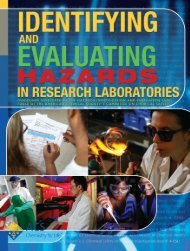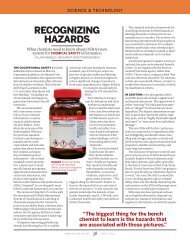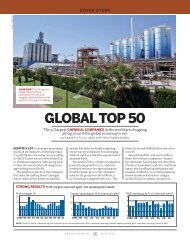Thursday - Chemical & Engineering News - American Chemical ...
Thursday - Chemical & Engineering News - American Chemical ...
Thursday - Chemical & Engineering News - American Chemical ...
You also want an ePaper? Increase the reach of your titles
YUMPU automatically turns print PDFs into web optimized ePapers that Google loves.
INFORMEX Show Daily | <strong>Thursday</strong> February 21 2013 | Anaheim Convention Center Anaheim California 23<br />
In a session Wednesday, Lalit Baregama, CEO and president of Syngeny, briefed the audience<br />
about the latest applications of specialty chemicals to drive technical innovation.<br />
From API Sourcing page 1<br />
tion technology skills for data and customer management, and political stability.<br />
Due to regulatory challenges and escalating costs, Speace suggested that<br />
companies wanting to do business with India consider the environmental, health,<br />
and safety records of suppliers there. Additionally, they should find out whether<br />
the drug is licensed by the Indian government, whether the company has ISO<br />
certifications and regulatory inspections. “When asking how committed your<br />
supplier is, you should determine operating and regulatory history, investments in<br />
facilities and talent, presence in your market, and customer support programs in<br />
place,” he said.<br />
From Green Chemistry page 1<br />
In the pharmaceutical supply chain, outsourcing is driven by cost, flexibility<br />
requirements, and increasing capabilities of contract manufacturing organizations.<br />
Companies must design sustainability into products and processes from inception<br />
and have early, frequent assessment, Constable said, adding “Finding the right<br />
balance is challenging.”<br />
Green chemistry spurs innovation when companies think about improving the<br />
environment while obtaining equal or better performance from green processes and<br />
remaining economically viable. The principles of green chemistry are maximizing<br />
resource efficiency, eliminating or minimizing hazards, designing systems holistically,<br />
and using life cycle thinking, according to Constable.<br />
Last year’s National Science Foundation’s Sustainable Chemistry Workshop concluded<br />
that systems level thinking is required, more fundamental research should be<br />
use-inspired, and green is not synonymous with sustainable. Furthermore, efficiency<br />
is necessary but not sufficient, and sustainability research and education should be<br />
multi-disciplinary and collaborative. “We have to develop a different set of skills,”<br />
Constable said, adding that the process can be streamlined by finding the right metrics<br />
“that are simple, meaningful, essential, and based on systems already in place.”<br />
The business of green chemistry has to emphasize how new or replacement markets<br />
will affect revenues, how greater efficiency and automation will reduce costs, how<br />
business and government processes will impact risks, how intangibles will affect the<br />
company’s image, and how new strategies will affect value and quality.<br />
ACS roundtables are showing companies how to collaborate non-competitively,<br />
address technical challenges, develop decision-making tools, and add resources to<br />
the supply chain.<br />
“<strong>Chemical</strong> companies have to understand that the risks are real, early<br />
design makes green chemistry workable, and resources are available,”<br />
Constable concluded.<br />
Thomas Speace, president and CEO of Neuland Laboratories<br />
India’s high degree of government control lends itself to bureaucracy and<br />
corruption, Speace said. “Patience is more than a virtue,” he added. “Invest the<br />
time to build relationships.”<br />
China is even bigger and more diversified, with unique cultures and languages<br />
in different provinces, according to Hui-Yin (Harry) Li, president of Wilmington<br />
PharmaTech Co. Most API production takes place along the Pacific coast where<br />
water for manufacturing is vital.<br />
Li cautioned that sometimes doing business depends on how <strong>American</strong> companies<br />
can support the capabilities of API suppliers in China to overcome deficiencies.<br />
“You need to know the boss and how he operates the place,” he said. “You have<br />
to understand the company’s relationship with the local government, the suppliers’<br />
resources, and whether they can invest in facilities and sustain growth.”<br />
API producers in China evolved from small town-owned chemical shops, cityowned<br />
local pharmaceutical companies, trading companies, new ventures managed<br />
by “returnees,” shops run by academics, and a combination. Some companies fail<br />
quickly, so companies doing business with them have to be vigilant regarding recent<br />
performance, current assets and capabilities, as well as the backgrounds of the<br />
people and organizations running them.















